|
|
|
Sort Order |
|
|
|
Items / Page
|
|
|
|
|
|
|
| Srl | Item |
| 1 |
ID:
113141


|
|
|
| 2 |
ID:
110125


|
|
|
|
|
| Publication |
2012.
|
| Summary/Abstract |
Nearly four centuries of American history have witnessed the evolving conflict between two competing sets of values: a belief that acting on behalf of the common good should guide social and political behavior, and a belief that unfettered individual freedom should dominate political and social life. Tracing this conflict from Puritanism through the American Revolution, the Civil War, the rise of industrialism, the Progressive Era, the New Deal, the Great Society, and the conservative revival of the Nixon/Reagan era, the essay reveals this clash of values as pivotal to understanding the narrative of American history, with contemporary political battles crystallizing just how basic this conflict has been.
|
|
|
|
|
|
|
|
|
|
|
|
|
|
|
|
| 3 |
ID:
131631
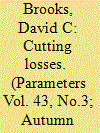

|
|
|
| 4 |
ID:
188386
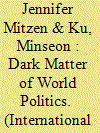

|
|
|
|
|
| Summary/Abstract |
International relations theory has had a trust revival, with scholars focusing on how trust can enhance interpersonal cooperation attempts between leaders. We propose there is another type of trust at play in world politics. International system trust is a feeling of confidence in the international social order, which is indexed especially by trust in its central unit, state persons. System trust anchors ontological security, and its presence is an unstated assumption of the international relations trust scholarship. In this paper we conceptualize system trust. We illuminate its presence by flagging the production of state personhood in a familiar case in international relations trust scholarship, the 1985 Geneva Summit between Reagan and Gorbachev. Interpersonal and system trust perspectives highlight different aspects of the same summit. The juxtaposition suggests new lines of research into the production of state persons in diplomacy, the relationship between interpersonal and system trust, and the impact of the rise of personalistic/patrimonial leadership on diplomacy and international order.
|
|
|
|
|
|
|
|
|
|
|
|
|
|
|
|
| 5 |
ID:
123105
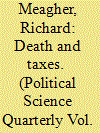

|
|
|
|
|
| Publication |
2013.
|
| Summary/Abstract |
RICHARD MEAGHER describes how and why the estate tax became part of the pro-family agenda of social conservatives. He explores the role of estate tax repeal in maintaining the alliance between economic and social conservatives within the Republican Party.
|
|
|
|
|
|
|
|
|
|
|
|
|
|
|
|
| 6 |
ID:
123245
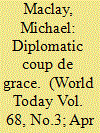

|
|
|
| 7 |
ID:
106345
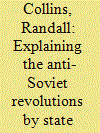

|
|
|
|
|
| Publication |
2011.
|
| Summary/Abstract |
A major area of advance in social science in recent decades has been the state breakdown theory of revolution. This is part of a larger body of theory about the rise of the modern state and the crises that can befall it along the way. It is sometimes referred to as the military/fiscal theory of the modern state, and as a branch of that larger theory, the state-centered theory of revolution. Here I will link military/fiscal theory of the state to geopolitical theory. Military/fiscal theory shows us the central mechanism, both of state growth and state breakdown; these are proximate causes, and further back in the causal chain are geopolitical conditions. Geopolitics tends to be the primer mover in any particular historical sequence, what sets off the changes that eventually lead to state growth or breakdown.
|
|
|
|
|
|
|
|
|
|
|
|
|
|
|
|
| 8 |
ID:
106270
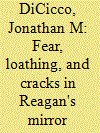

|
|
|
|
|
| Publication |
2011.
|
| Summary/Abstract |
Investigation into an often-overlooked Cold War episode reveals a tipping point in the Reagan administration's approach to the Soviet Union. In November 1983, NATO military exercise "Able Archer 83" reportedly touched off a crisis atmosphere among Soviet officials who feared a surprise nuclear attack. Intelligence reports about the war scare startled US President Ronald Reagan, altering his understanding of Soviet threat perceptions and prompting him to embrace his moderate advisers' recommendations that the administration take a more conciliatory approach toward the country Reagan had earlier labeled the "evil empire." By highlighting Soviet fears of the United States, intelligence stemming from Able Archer 83 cracked Reagan's mirror images and catalyzed a policy shift from hostile confrontation toward cautious cooperation. The case study identifies facilitating conditions for the shift and yields counterintuitive insights relating to international crises, perception and misperception, and the domestic politics of rivalry.
|
|
|
|
|
|
|
|
|
|
|
|
|
|
|
|
| 9 |
ID:
154817
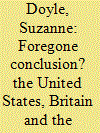

|
|
|
|
|
| Summary/Abstract |
Existing studies of the United Kingdom’s purchase of Trident D5 missiles have simplified the Reagan administration’s sale. Using previously classified documentation, this article highlights the potential political and financial ramifications of a sale agreement that led to complex deliberations within the Thatcher government up until the final day of negotiations. The White House viewed the sale as a means to strengthen Western nuclear and conventional forces to counter the perceived Soviet threat. However, even within this conducive environment, US officials still drove a hard bargain with their British counterparts, in order to support US strategic interests. Indeed, the White House utilised the sale to influence British defence policy. In this way, the Trident agreement was not a foregone conclusion but rather a continuation of the friendly, but not preordained, nature of US–UK nuclear relations that has been renegotiated, according to the varying interests of both parties, throughout the partnership's existence.
|
|
|
|
|
|
|
|
|
|
|
|
|
|
|
|
| 10 |
ID:
112150
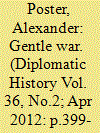

|
|
|
|
|
| Publication |
2012.
|
| Summary/Abstract |
Alexander Poster's article, "The Gentle War: Famine Relief, Politics, and Privatization in Ethiopia-1983-1986" examines the Reagan administration's efforts to resolve Cold War disputes through humanitarian assistance. With the Vietnam War fresh in minds of both Congress and the American public, Reagan officials dealt with hesitancy when they pressed for military and developmental grants for foreign nations. M. Peter McPherson, administrator for the Agency for International Development, discovered a solution to the Reagan administration's problem. McPherson noted that Americans still supported humanitarian objectives abroad and sought to incorporate humanitarian relief into President Reagan's foreign policy strategy. The Ethiopian famine of the mid-1980s resulted in the largest mobilization of relief resources in U.S. history. The American response was both a humanitarian effort and a targeted attempt to discredit socialist dictator Mengistu Haile Mariam. American policymakers drew up their policy with the intent to strengthen rebel areas, discourage collectivization of land, and take credit for most of the relief effort. Thus, disaster relief in Ethiopia served a dual purpose: to provide humanitarian aid and to further American security interests.
|
|
|
|
|
|
|
|
|
|
|
|
|
|
|
|
| 11 |
ID:
106340
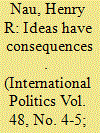

|
|
|
|
|
| Publication |
2011.
|
| Summary/Abstract |
In this essay, I make the case that the Cold War was caused by a competition of ideas rather than by a struggle for power or a failure of international institutions. The Cold War started when two sets of ideas diverged sufficiently - capitalism and communism - that they precluded either a realist - spheres of influence - or liberal - United Nations - solution to postwar differences in Europe. It ended when one set of ideas prevailed, and democracy and markets spread throughout the whole of Europe, eclipsing realist and liberal outcomes. The Soviet Union disappeared, which realists never expected; whereas the United Nations, which functioned briefly as a classic liberal collective security operation in the first Persian Gulf War, was quickly replaced by a democratic NATO in Bosnia and Kosovo. The competition of ideas did not end in the 1990s, however. It continues today in other forms and will shape the contours of military conflict and international cooperation in tomorrow's world, no less that it did during the Cold War.
|
|
|
|
|
|
|
|
|
|
|
|
|
|
|
|
| 12 |
ID:
106346
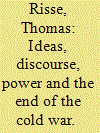

|
|
|
|
|
| Publication |
2011.
|
| Summary/Abstract |
Reagan's rhetoric and actions in the arms race triggered considerable opposition, which was necessary to establish a counter-discourse in particular through the peace movements in the West, which then impacted upon the discussions in Moscow. It enabled Gorbachev to overcome his considerable domestic opposition and to make the necessary concessions, which started to bring the cold war to an end. In this sense, the peace movements won the cold war, too. The end of the cold war was as much a discursive struggle over ideas about international order and the right mix of deterrence and détente as the East-West conflict itself. It is a matter of good fortune that the cold war had a relatively happy ending and that Europe was reunited. Claiming victory for one side or the other seems to be beside the point, even 20 years later.
|
|
|
|
|
|
|
|
|
|
|
|
|
|
|
|
| 13 |
ID:
143902
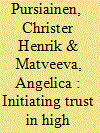

|
|
|
|
|
| Summary/Abstract |
Trust is central to international politics. Trust-related theoretical arguments can be divided between rationalist, cultural and psychological schools. We present concise reviews of these approaches, emphasizing the initial trust-creation phase, and apply these factors to our historical case: the emergence of a fragile interpersonal trust between Mikhail Gorbachev and Ronald Reagan before and during their first meeting in Geneva in 1985. Based on archives and first-hand reminiscences, we conclude that the cultural trust theories are not able to contribute much to the initial trust-building process in this particular case, except for explaining the obstacles for trust. The rational approaches explain the necessary but not sufficient conditions for trust to emerge. Ultimately, what triggered the trust that ultimately ended the Cold War cannot be understood without taking into account the cognitive and psychological factors involved in this interpersonal relationship.
|
|
|
|
|
|
|
|
|
|
|
|
|
|
|
|
| 14 |
ID:
108887
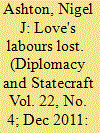

|
|
|
|
|
| Publication |
2011.
|
| Summary/Abstract |
Relations between Britain and Jordan underwent a revival during the premiership of Margaret Thatcher between 1979 and 1990. Although no longer the dominant power in the Middle East, Britain's membership of the European Economic Community and the close relations between Prime Minister Thatcher and President Reagan meant that Britain was seen by King Hussein as an influential power to be courted. Thatcher shared Hussein's views about the Arab-Israeli peace process and lent him strong support as the voice of Arab moderation. She also sought to use her personal relationship with Hussein as a vehicle to further British interests, particularly through her promotion of British arms sales, both directly to Jordan, and indirectly, through Jordan, to Iraq. This article makes use of a large body of British official documents secured under the Freedom of Information Act and Jordanian documents from the Royal Hashemite Archive in Amman to illuminate the development of bilateral relations over the course of the decade. It concludes by showing how the differing responses of Thatcher and Hussein to the Iraqi invasion of Kuwait in August 1990 ruptured their relations. Drawing on sources which have previously been unavailable the article offers a fresh perspective on important aspects of the international history of the Middle East during the 1980s.
|
|
|
|
|
|
|
|
|
|
|
|
|
|
|
|
| 15 |
ID:
092324


|
|
|
|
|
| Publication |
2009.
|
| Summary/Abstract |
The changing geographical foci of the geopolitical code of the United States are examined by a content analysis of the presidential State of the Union Speeches between 1988 and 2008, the last year of President Reagan's term through the presidency of George W. Bush. The State of the Union speeches are interpreted as geopolitical discourse within a structural setting, using seven foreign-policy paradigms as an organising framework. The empirical findings illustrate an increase over time in the number of regions and countries mentioned in the speeches. Also, notable differences between administrations in terms of their advocacy of globalist or regionalist policies and emphasis upon allies or adversaries are found.
|
|
|
|
|
|
|
|
|
|
|
|
|
|
|
|
| 16 |
ID:
094265
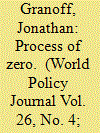

|
|
|
| 17 |
ID:
106342
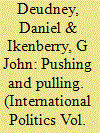

|
|
|
|
|
| Publication |
2011.
|
| Summary/Abstract |
The security environment of the Soviet state during the Gorbachev period was distinctly different from earlier periods. The increased number of non-aggressive states in the Soviet Union's international environment further enhanced the security of the regime in historically unprecedented ways. Nuclear weapons freed the Soviet Union from fears of territorial aggression, while making its own expansion too costly. The achievement of military parity with the West gave the Soviets a further enhanced sense of security. Nuclear weapons also created significant common threats from nuclear war, providing strong incentives for accommodation and cooperation. Looking from the post-Cold War era, both Reagan and Gorbachev finally turned out to be anomalies. The particular circumstances that had created the opportunities for extraordinary breakthroughs by the diplomacy of these two men disappeared almost as quickly as they had arisen.
|
|
|
|
|
|
|
|
|
|
|
|
|
|
|
|
| 18 |
ID:
095516
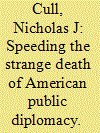

|
|
|
|
|
| Publication |
2010.
|
| Summary/Abstract |
The Reagan administration knew how to throw a great party, and the celebration held on November 17, 1988, in the Organization of American States building in Washington, DC, was no exception. Stretch limos jammed that part of town. Guests included media mogul Rupert Murdoch and the president himself. The gala dinner honored the achievement of Charles Z. Wick, who had served throughout the Reagan years as director of the U.S. Information Agency (USIA).1 Originally established by Eisenhower in 1953, USIA conducted the U.S. government's public diplomacy: advancing foreign policy by engaging foreign publics through radio, press work, exhibitions, publications, cultural exchanges and a host of other channels. Wick's achievement was impressive. USIA had been a key part of the Reagan era's ideological barrage against the Soviet bloc, telling the world about the shooting down of the Korean airliner KAL 007, telling the people of the Soviet Union about the meltdown of Chernobyl, and mobilizing just enough European sympathy to allow the deployment of Pershing missiles. USIA was also part of the emergence of a new political order in Eastern Europe, conducting all manner of exchanges with the Gorbachev regime, and encouraging the voices of reform. The momentous political changes in Eastern Europe during the following year seemed to bear out the message of that November night: that USIA and public diplomacy were now central to American foreign policy. Yet the Reagan/Wick era of public diplomacy did not last. In 1999, USIA was absorbed into the State Department and public diplomacy thereby placed on a back burner.
|
|
|
|
|
|
|
|
|
|
|
|
|
|
|
|
| 19 |
ID:
039500
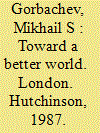

|
|
|
|
|
| Publication |
London, Hutchinson, 1987.
|
| Description |
vii, 389p.hbk
|
| Standard Number |
0091736013
|
|
|
|
|
|
|
|
|
|
|
|
Copies: C:1/I:0,R:0,Q:0
Circulation
| Accession# | Call# | Current Location | Status | Policy | Location |
| 028793 | 947.0854092/GOR 028793 | Main | On Shelf | General | |
|
|
|
|
|
|
|
|
|